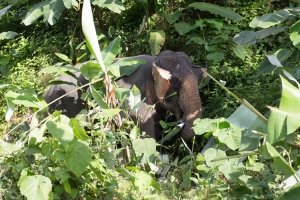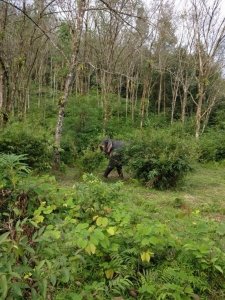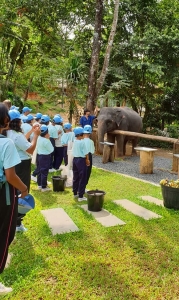A Healthy Elephant is a Happy Elephant


Like humans taking multivitamins, elephants can be kept healthy with nutrient supplements. Every elephant keeper has his own ideas about the best supplements, but they are often made from a mixture of ground feed pellets, containing minerals and vitamins, plus water so they are not too dry. Mashed bananas make them delicious and help to combine the mixture into balls, 
STEF has been teaching local Thai children about elephant welfare on its sponsored activity days at Phang Nga Elephant Park as part of our PLACE2C programme which we hope will empower children to learn about and work with elephants in ethical, sustainable ways in the future.

Wild elephants get much of their essential minerals through eating mineral-rich soil or digging for salt licks located on their foraging routes. These provide sodium and other minerals such as calcium and magnesium that are vital to their health.
Scientists agree that more studies are required into the mineral requirements of elephants, but here are a few of the minerals and vitamins that elephants need to keep them healthy. Here are some of the important nutrients and why they are vital for life:
| Nutrient: | Can be found in: | Some of the important roles: |
| Sodium | Soil,
salt deposits |
For the proper function of the nervous system, the bioelectrical network behind movement and brain activity
As an essential electrolyte, to help ensure elephants absorb enough of the 200 L of water they drink daily, so maintaining blood pressure and hydration |
| Iron | Grasses, leaves, twigs | A component of haemoglobin, the protein that carries oxygen throughout the body. Oxygen is essential for life, breaking down sugars, releasing energy for growth, maintenance, repair and movement |
| Phosphorus | Leaves and grasses | Binds calcium to form bones and cartilage so any deficiency can lead to weakened bones and joints
Forms reactive components needed to break down sugars, releasing energy for growth, repair and movement |
| Calcium | Bark, leaves, leguminous plants | Forms strong bones and cartilage so a deficiency can lead to bone and joint disease
Stimulates hormone secretion, immune defences, nervous activity for thinking and movement, muscle contraction for movement and heart activity, blood clotting at wounds |
| Vitamin B | Made by a range of gut bacteria | Makes fatty insulation for nerves so they can transmit signals for thinking and movement
Maintains healthy skin ensuring good growth of foot-pads and toenails, so lessening chance of lesions and cracks which can impair mobility |
| Vitamin E | Leaves and grasses | As an antioxidant, scavenges reactive metabolic products that can attack body tissues, protecting integrity and activity of the immune and nervous systems and muscles
Stimulates tissue repair and wound healing
|
What Must be Done Now?
Only 10% of forested elephant habitat remains in Thailand; most land is now dedicated to crops for human consumption which don’t meet elephants’ nutritional needs. At STEF, we grow elephant food sustainably on our land at Klok Kloi, near Phuket. Farming optimally-cultivated food for elephants needs to be encouraged, along with reduced use of pesticides and fertilisers.


